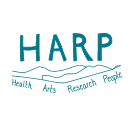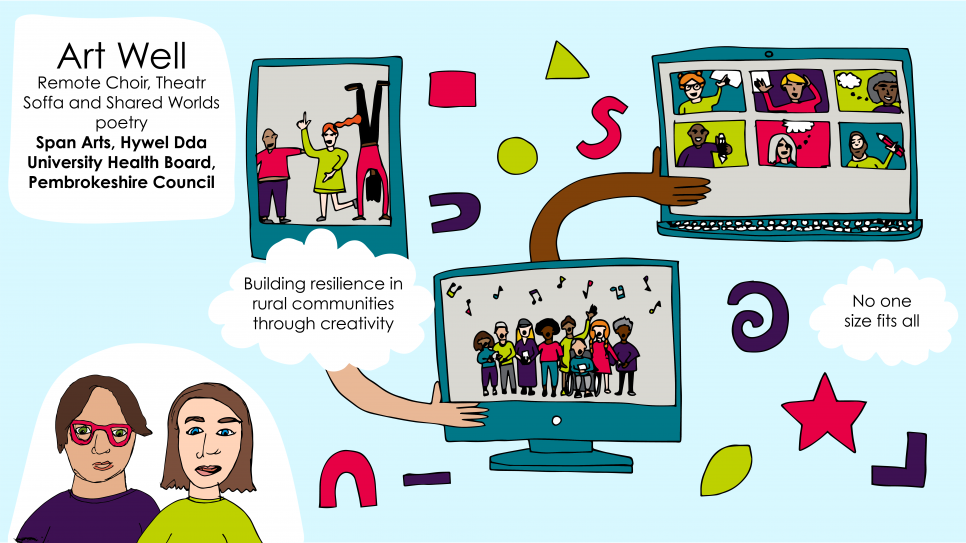Emrys Barnes, Arts and Health Coordinator for ‘Art Well’, shares his team’s experience of delivering three distinct arts and health projects connecting the community’s isolated during a pandemic
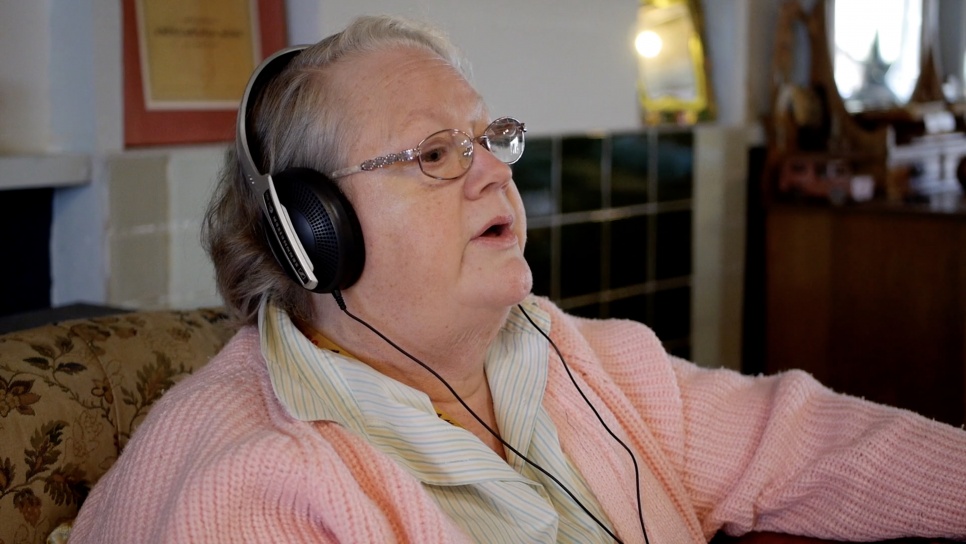
For many vulnerable people in rural Pembrokeshire, particularly older people and those with mental health conditions, the Covid-19 pandemic and lockdown restrictions exacerbated their isolation.
To connect participants to the project, we worked with Pembrokeshire Association of Voluntary Services (PAVS)’ Community Connectors, alongside Pembrokeshire County Council’s Social Care Services and the Digital Connections group (Digital Communities Wales, Age Cymru Dyfed and Delta Wellbeing). We also had evaluation support from the Research, Innovation and Improvement Team at Hywel Dda University Health Board.
We were keen to provide creative wellbeing spaces to those who needed them most, exploring how we could reach and engage with them and the impact different activities had on mental wellbeing and feelings of isolation. We were also curious to discover how Covid-19 had affected their relationship with technology.
The power of performance
With increasing evidence confirming the positive effects of singing on mental and physical wellbeing, our ‘Remote Choir’ project beamed a singing facilitator into different Pembrokeshire County Council care homes for residents with learning disabilities.
More than 40 people took part in singing workshops held via video call and focused on the joy of singing rather than formal technique.
Meanwhile, people who were shielding or with limited mobility were invited to perform with Theatre Soffa, an innovative and popular online community theatre group run by Span Arts.
Participants joined from home each week for rehearsals, including a former Pembrokeshire resident who had relocated to Canada, before an end-of-project live performance. Many were made aware of the project by the PAVS community connectors, who link vulnerable and isolated people to activities and groups to support their wellbeing.
The groups’ performances were streamed online in Welsh and English, with 19 participants and many people viewing the live streams.
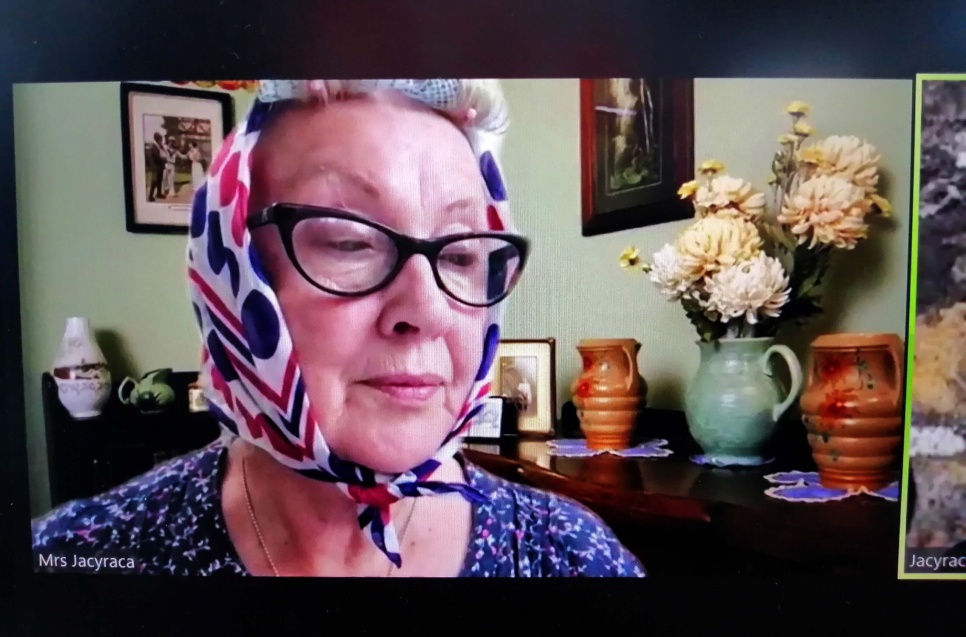
Participants said performing with others gave them a sense of fulfilment, and that it worked to ‘lift their moods’ and ‘cheered them up’.
Finally, we also worked with Kerry Steed, a local writer and poet, who led a series of sessions on writing for wellbeing – an emerging online practice that uses creative and reflective writing to explore mental health and participants’ relationship to the wider world and those around them.
Kerry led poetic exercises each week, curating a welcoming, safe space that gave 25 participants the confidence to try writing themselves. They shared what they wrote with fellow participants during the session, prompting conversation, reflection and a sense of group identity.
One man joined the Shared Worlds project with his wife, to help her think about poetry and writing again. In the process, it helped him connect to poetry, and start writing poetry.
Overcoming new challenges
Despite our years of experience delivering community arts and health projects, there were new challenges and learnings for us and the artists delivering them online during a pandemic.
Care homes were under extraordinary pressure during the pandemic and many had not worked with arts charities before, so engaging them with our online singing workshops was initially difficult.
When usual promotion techniques stuttered, we resorted to telephoning care homes across Pembrokeshire individually to explain what we were doing and encourage their participation – a time consuming but effective approach
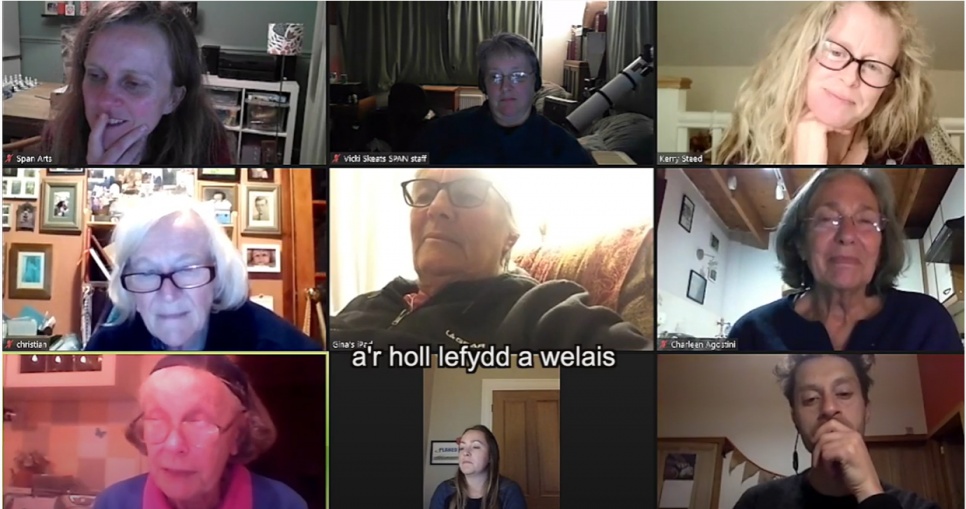
The HARP project has challenged and changed our way of thinking about how we collect information from participants.
For the theatre and poetry workshops we encouraged applications from people experiencing social isolation or mental health challenges.
They were invited to self-report their needs to us, including any disabilities, health conditions or access requirements, in an online registration form. But many didn’t - perhaps because they didn’t self-identify as having a particular condition or need, or because they found online forms impersonal.
This presented practical challenges for the artists leading our projects as they sought to facilitate a safe and sensitive space for people with diverse but often undisclosed needs.
As a result our writing group lead Kerry found herself assessing participants’ needs during the sessions, which was challenging.
Taking on board advice from a long-term arts and health project participant, who had spoken at a HARP learning session about the value of human conversations when evaluating activities’ impact, I called each member of the group to check how they were doing.
It was another time-consuming but effective approach. During those conversations, some offered new information about their personal circumstances and access needs that helped us shape our future delivery.
We learned that to deliver a high-quality artistic project that sensitively cares for people with diverse and sometimes acute needs, more staff time and capacity is needed to build participants’ trust through one-to-one conversations. That additional time is needed to liaise with artists about technical details of performances and contract details, to establish recruitment pathways for participants with specific needs, market the activities, respond to queries, and evaluate success.
Creating new connections
Despite the challenges, there have been several successes.
Offering projects online has created new opportunities for people to join arts activities who may not have previously because of disability, financial barriers, or simply the rural nature of Pembrokeshire living.
We have also witnessed personal stories of growth.
One participant in the creative writing group, for example, was a former professional writer who had stopped writing when they were diagnosed with dementia. Our group gave them a regular space to start writing again, helping them rekindle that lost love.
Care workers on the Remote Choir project discussed the impact that music had on their residents. One said that the project ‘highlighted what a difference music can make’.
Another said the project ‘boosted the morale’ of residents and their carers through participating and performing together. Some told us residents who have lost some or all capacity to communicate verbally were able to remember the words of familiar songs and sing them.
Other residents who were non-verbal could otherwise recognise and feel excited and more animated through hearing music or were able to actively participate by playing instruments.
This HARP project has increased Span Arts’ reach across Pembrokeshire. We now see our future as a hybrid model of in-person and online activity.
Span Arts has formed a strong relationship with PAVS through this project, too, which was instrumental in signposting people with specific needs and protected characteristics to our projects. We are excited about the many future collaboration opportunities with them ahead.
Art Well was a collaboration between SPAN Arts, Pembrokeshire Association of Voluntary Services (PAVS), PAVS’ community connectors, Pembrokeshire Council, and Hywel Dda University Health Board’s research, innovation and improvement coordination hub.
